Tags
books, classics, cooking, Donna Tartt, easy recipes, food, Lamb, literature, Mushrooms, reading, recipes, The Secret History, winter recipes
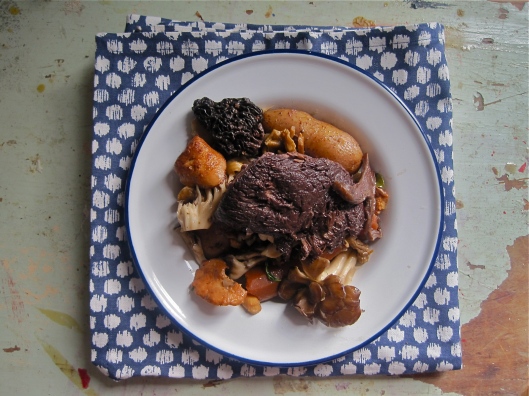 When I was a little kid one of my (many) strange and irrational fears was that someday every combination of musical notes would be exhausted and that new music would cease to exist. As a grown-up this is a hard thing for me to explain, which is probably why it was so hard for my parents to understand when I came to them with it. They thought it was just another quirk of mine, and I suppose it sort of was, but I was genuinely terrified. It was in my second year of taking violin lessons that this anxiety emerged, learning to read music had somehow sparked it. My older sister was in her early teens and heavily into radio pop and hip hop and I took their repetitive tunes and constant samplings of older songs as proof that my fear was being realized.
When I was a little kid one of my (many) strange and irrational fears was that someday every combination of musical notes would be exhausted and that new music would cease to exist. As a grown-up this is a hard thing for me to explain, which is probably why it was so hard for my parents to understand when I came to them with it. They thought it was just another quirk of mine, and I suppose it sort of was, but I was genuinely terrified. It was in my second year of taking violin lessons that this anxiety emerged, learning to read music had somehow sparked it. My older sister was in her early teens and heavily into radio pop and hip hop and I took their repetitive tunes and constant samplings of older songs as proof that my fear was being realized.
In the evenings after school I would spend hours playing records from my dad’s collection, which spanned the entirety of our living room, finding comfort in The Smiths and The English Beat, The Pogues and Dusty Springfield while I did my homework. By the end of the night, though, I always felt that familiar dread creeping in. It’s already all been done—I thought when I heard Keith Moon’s drumming—how could anyone ever do any better than this?
Lately, I’ve felt a similar anxiety creeping in. What if someday all of my creative energy just runs out? What if eventually there simply isn’t anything left to write about? What if it’s all already been done?
What I’m trying to tell you is that I am in the midst of the worst writer’s block I have ever experienced. My fingernails are bitten to the quick, I’m self-medicating with entire loaves of bread, I’m a nervous wreck. It’s sort of a shameful thing to admit, especially when one has just signed a book deal, but in most cases saying the things that you are most afraid of out-loud usually somehow makes them seem less scary (unless you finally muster enough courage to say it to your violin teacher and she just stares at you with her mouth agape). In order to admit that you have writer’s block you also have to admit that you are a writer. This is a terrifying declaration. It feels heavy and self-indulgent and pressure-filled in a way that saying “I’m a butcher” doesn’t.
The other night over beers I admitted this to a friend. I’m sure she was expecting a much simpler answer to her question of “How’s the writing going?” We ordered more beers (this helped Hemingway, right?) and my friend started telling me about all of the famous writers she had heard about who had suffered terrible creative blocks throughout their careers. The conversation eventually lead to Donna Tartt, whose alleged writer’s block has generated massive amounts of media attention and intrigue since she published The Secret History in 1992. The book was an instant bestseller and people hungrily awaited her next book. Eleven years passed in the interim between The Secret History and The Little Friend and people started talking. Rumors of writer’s block-induced breakdowns abounded.
I had never read any Donna Tartt, I think her name always lead me to believe that her books would be of the supermarket romance variety (not that there’s anything wrong with those). My friend urged me to pick up The Secret History, so the next day I went to the bookstore and by the end of the night I had torn through almost the entire book. It’s no surprise to me that Tartt had to take eleven years between this book and her next. The anxiety of others’ influence is one thing, but I imagine the anxiety of your own influence is quite another. This book must have been a daunting one to follow up.
The book’s narrator, Richard, is reminiscent of Charles Ryder from Brideshead Revisted—a boy running from his humble beginnings in hopes of making a much more interesting life for himself. He leaves Plano and arrives at the fictional Hampden college in Vermont, where he becomes infatuated with a group of five misfit classics students who have isolated themselves from the masses. Henry, Bunny, Charles, Camilla and Francis spend their days studying ancient Greek with their charming and enigmatic professor, Julian, drinking massive amounts of alcohol and spending money faster than their parents can make it. After a few short weeks Richard infiltrates the group and quickly finds himself in way over his head.
Things come to a boiling point when Henry, the group’s leader, decides that they have to kill Bunny because he knows a secret that could destroy them all (this is given away in the very first sentence, so I haven’t ruined anything). Henry begins experimenting with poisonous wild mushrooms, trying to determine how many it would take to kill a person Bunny’s size. That night, Richard is invited to Professor Julian’s house for dinner, and the reader, unsure at this point of who in this dysfunctional group can be trusted, watches as Julian presents him with a plate of Henry’s wild mushrooms.
There was roasted lamb, new potatoes, peas with leeks and fennel; a rich almost maddeningly delicious bottle of Chateau Latrou. I was eating with better appetite than I had in ages when I noticed that a fourth course had appeared, with unobtrusive magic, at my elbow: mushrooms. They were pale and slender-stemmed, of a type I had seen before, steaming in a red wine sauce that smelled of coriander and rue.
“Where did you get these?” I said
“Ah. You’re quite observant,” he said, pleased. “Aren’t they marvelous? Quite rare. Henry brought them to me.” (240)
The day I finished the book I got an email from the friend who had recommended it. It was a press release stating that Donna Tartt would be publishing a new novel with Little, Brown this year. It will be her third book in more than twenty years. When asked what took her so long Tartt brushed off the rumors of writer’s block and unapologetically and succinctly answered, “Writing takes time.”
Ingredients:
Serves 6
- 1 3-pound bone-in leg of lamb steak
- 1 quart chicken stock
- 1 750 ml bottle red wine (I used Cabernet Sauvignon)
- 1 pound dried mushrooms (whichever you like, I used lobster, morels and porcinis)
- 5 carrots
- 1 pound fingerling or red potatoes
- 4 small shallots
- 4 cloves garlic
- 1 stick of butter
- 1 bunch thyme
- 1 bunch rosemary
- Any variety of wild mushrooms (I used hedgehog, yellow-foot chanterelles and maitake)
- Salt and pepper to taste
Directions:
Salt and pepper your leg of lamb generously and allow it to sit outside of the refrigerator until it reaches room temperature—about 40 minutes. Heat a medium skillet until very hot and sear the lamb steaks for 3 minutes on each side. Place leg of lamb in a dutch oven and cover with chicken stock, red wine, dried mushrooms, rosemary, thyme (reserve a few sprigs for cooking the fresh mushrooms), carrots and potatoes. Mince your garlic and shallots and, in the same pan you seared off your leg steaks, cook them over medium heat with 2 tablespoons of butter until translucent. Throw them in the dutch oven with the rest of the ingredients and add 4 tablespoons of butter. Salt and pepper liberally and put the entire thing in the oven at 300 degrees Fahrenheit for 5 hours, or until the meat is falling off the bone.
Strain the lamb, reserving the brasing liquid. Pick meat, potatoes, carrots and dried mushrooms out and set them aside. Place braising liquid in a medium saucepan and simmer until reduced by half—this should thicken it into a sauce. While your sauce is reducing put the remaining two tablespoons of butter in a sautee pan and add all of your fresh mushrooms and reserved thyme sprigs. Salt and pepper liberally and cook over medium heat until the mushrooms are crisp at the edges and have released most of their liquid. To serve, spoon the mushrooms into a serving bowl, top with lamb, carrots and potatoes and cover in red wine sauce. Good bread will be necessary for mopping up every last bit.
Don’t forget to follow along for updates on Facebook, Twitter, Instagram and Tumblr!

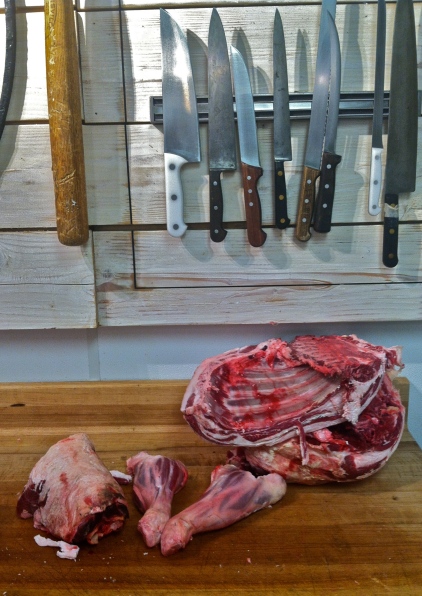
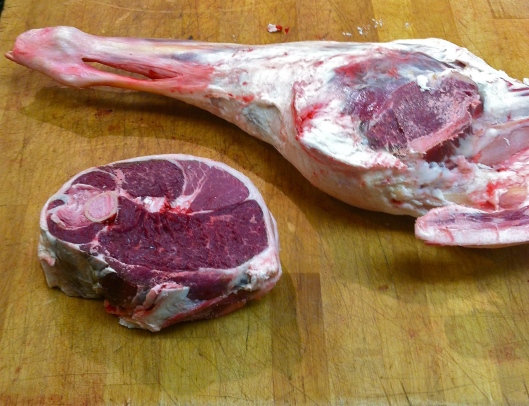
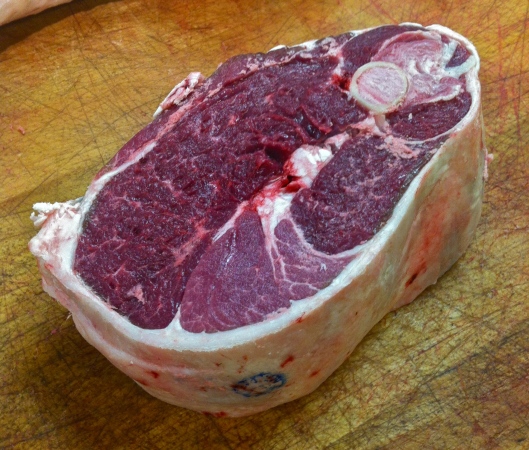
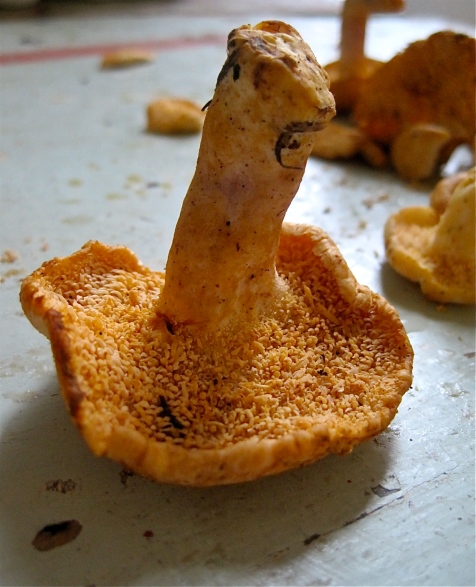
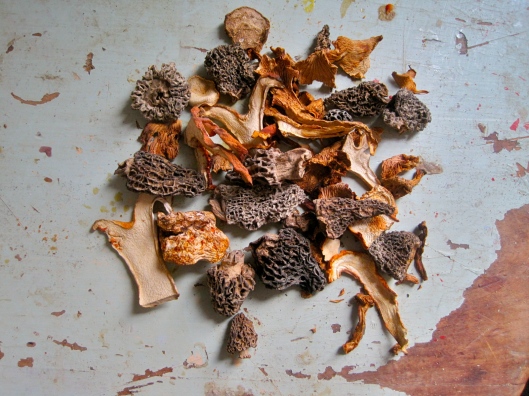
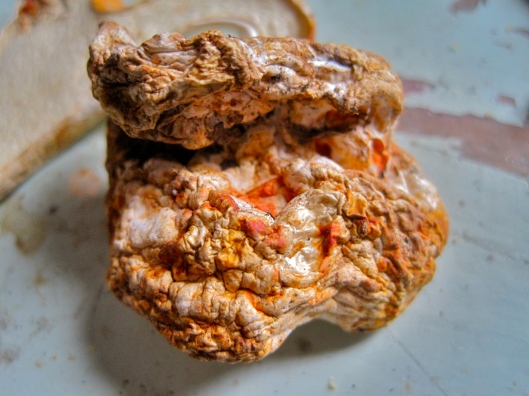
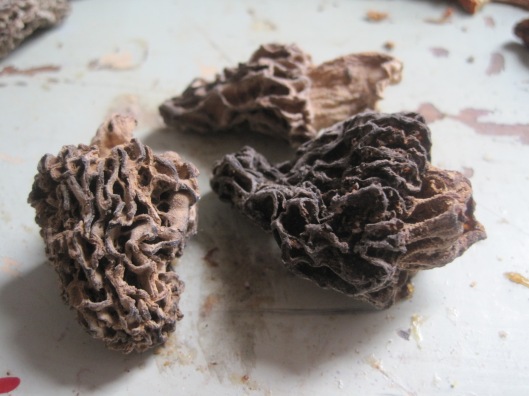
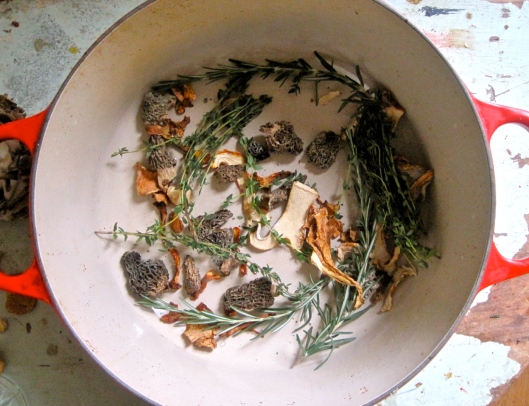
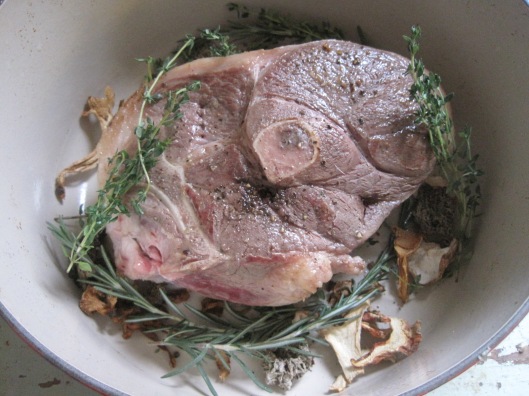
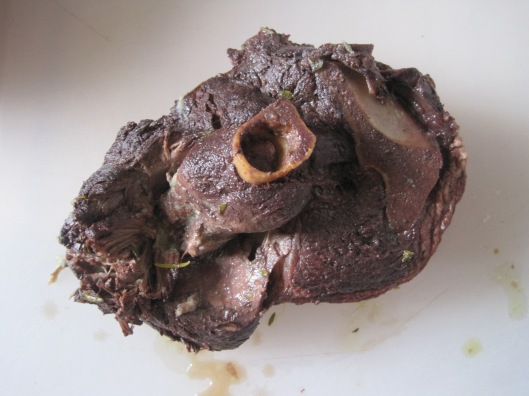
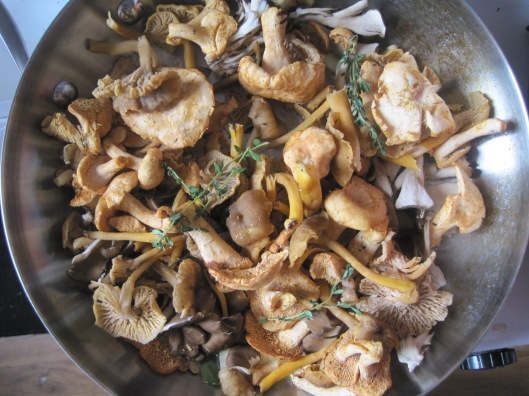
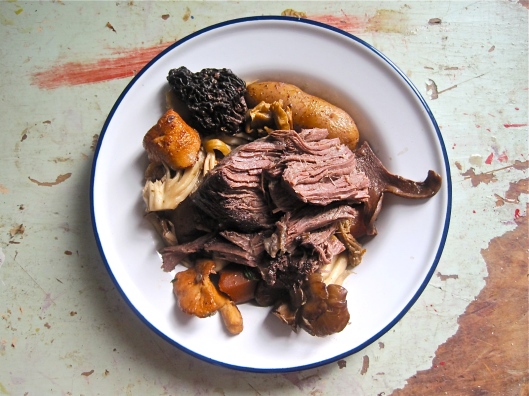
Cara, this is the most wonderful and honest post you’ve ever written! I love when your stories divulge details of your modern life by retelling events of your childhood. I love the Cara in Yummy-Books as much as I love the literature and recipes. BE TOUGH AND STRONG AND KEEP PUSHING FORWARD. Creativity takes time. xx
Here’s reassurance, I hope, in video series form: http://www.everythingisaremix.info/watch-the-series/. Also, The War of Art is infinitely helpful — http://is.gd/06bVnQ.
You are simply amazing. If I ate lamb id make this, but I most certainly will be reading this book
Cara I know you’ve read “The Burden of the Past and the English Poet.” (“It’s already been done!”) Wonderful memories, wonderful recipe, wonderful book, and wonderful images of Moon the Loon. So glad you wrote about this book. Keep the faith–The words will flow in no time. Noodle
“Nothing in the world is worth having or worth doing unless it means effort, pain, difficulty…”
You can do it! You are amazing and so is this post!
Cara, I love lamb and your recipe sounds wonderful and different.I’ll have to try it. As for the writers block, that too shall pass as is obvious with this article.
Keep up the good work,
Seymour
Perfection. I remember when Tartt’s book came out and how insanely jealous I was of it. I think we’re the same age, and while I’m long since past the jealousy, I am glad that you’ve reminded me of her and that book. I will, perhaps, finally read it!
What a beautiful, honest post, Cara. Your art and journey inspire me daily. Keep pushing and hang in there, this will pass. And, I ain’t worried about a thing ’cause we both live by those wise, wise words from the Refused show: STAY MOTHERF*G HUNGRY (still plan on getting some version of that as a friend tat with you one day, btw;)) xx
Cara, this is beautiful. It’s so encouraging to hear about your process (gulp, forgive me for using the word, it sounds utterly silly) and it’s juxtaposed so wonderfully with Donna Tartt’s work and similar struggles. So glad you loved the book! I just gave it as a gift to a friend.
Beautiful post!
(And thanks for the book leads.)
I just recently found your blog and I have to say, I’m in love. Your writing is beautiful and the way you weave together literature, food, and autobiography is wonderfully unique. It might be hard to see from the inside, but you are a writer–a very talented one–and I’m sure that you’ll be able to break through the writer’s block. Good luck!
Pingback: Rice with wine and mushroom cream, served with vegetables sauteed in white wine. | Chocolate Spoon & The Camera
I remember that book well. I knew someone who was positively obsessed with it. I had forgotten about the mushrooms, but your post and the photos brought it back. Dried mushrooms, or maybe mushrooms in general, are kind of ominous-looking, no?